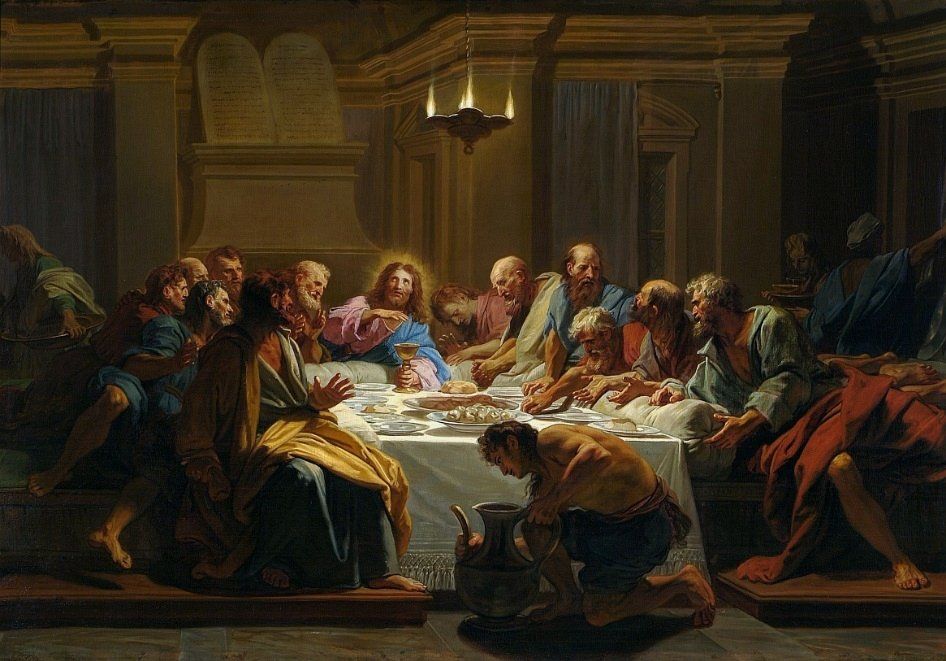Homily, Holy Thursday 2022
Holy Thursday of the Lord’s Supper, 2022

Readings: Exodus 12:1-8,11-14; 1 Corinthians 11:23-26; John 13:1-15
This evening, we begin our three-day liturgy which marks the holiest days of the liturgical year – the Sacred Paschal Triduum. The Triduum consists of three 24- hour periods that stretch over four calendar days- it begins at sundown on Holy Thursday with Mass of the Lord’s Supper and concludes with evening prayer at sundown on Easter Sunday with its highpoint the celebration of the Easter Vigil in the Holy Night.
Tonight, is a glorious celebration of two great gifts Christ has given to his Church: the gift of himself in the Eucharist, and the gift of the Sacrament of Holy Orders. And this priesthood is rooted in a mission of humble service, the Mandatum, the Lord’s command to love through the service of others. The three events we commemorate reassure us of Jesus’ immense love for us. Even as he completes his mission on earth, he finds ways to personally stay close to us.
Our Lord’s institution of the Eucharist is recalled in Paul’s Letter to the Corinthians, where he writes of the night Jesus was handed over. At that Last Supper, the simple Passover meal is transformed as Christ establishes a new and everlasting covenant with all people. Knowing that the hour of his death was near and that he would soon depart the earth in human form, he instituted the Eucharist so that he would remain in sacramental form (CCC 1380). He said,
“Do this in remembrance of me”. And the Church has never failed to heed his commands. We must be ready every day to celebrate the feast of Jesus’ love for us in the Eucharist and, in the strength of the Eucharist, continue our own pilgrimage as servants of the people of God and of the world. At the end of today’s liturgy, we will have the opportunity to remain with Jesus for a few moments in the altar of repose.
While the Synoptic Gospels (Matthew, Mark, and Luke) narrate a description of the Institution of the Eucharist at the Last Supper, St John replaces the Institution narrative with the incident of the washing of the disciples’ feet. With this act of service Jesus uses the opportunity to teach His disciples about their responsibility to wash one another’s feet in humble service to each other. As Christ has done for us, should we do for each other.
We, your priests trace our priesthood to this night for in instituting the Eucharist Jesus also instituted the ministerial priesthood. I request you to pray for the priests. Your prayers will help us to be the oil of gladness, to be good shepherds after Jesus’ heart. As Jesus knelt before his disciples, so we should serve you with devotion. As Jesus was the Word of God in the flesh, so too we should preach the Word in season and out of season, and not only with words but also with our example. As Jesus took bread, blessed, and broke it, so too we, your priests, should be humbled and awestruck every time we say: “This is my Body given for you!” “This is my Blood poured out for the forgiveness of sins.”
In celebrating the paschal mystery in these three days but one continuous liturgical feast, we participate in the summit of our liturgical year. It is the perfect time to offer our own sacrifice of thanksgiving, and commit to answering the psalmist’s question: How shall we make a return to the Lord for all the good he has done for us? O Sacrament most holy, O Sacrament divine, all praise and all thanksgiving, be every moment Thine!
Public domain artwork:
Last Supper by Jean Jouvenet
Homilies











